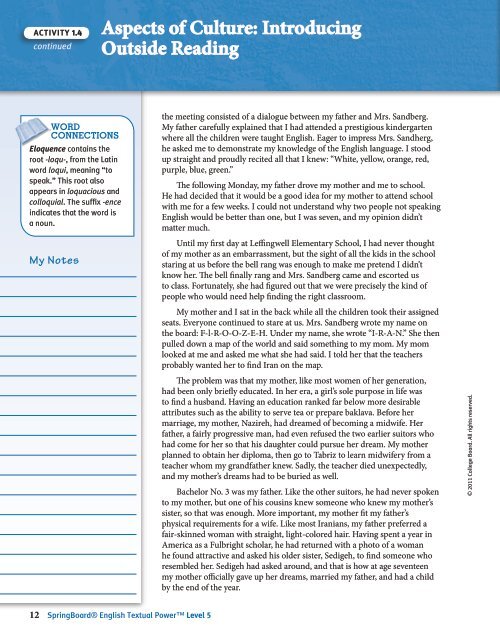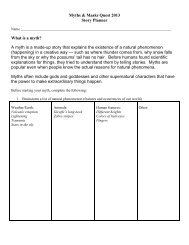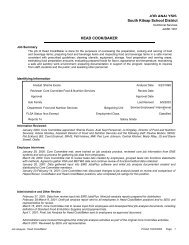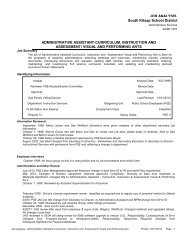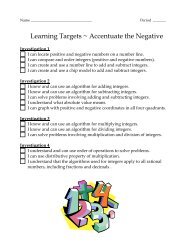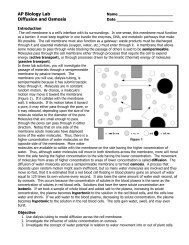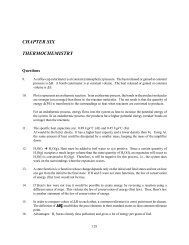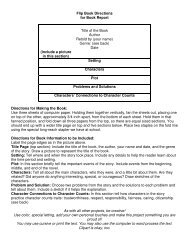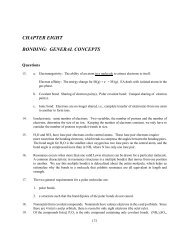Voices of Modern Culture
Voices of Modern Culture
Voices of Modern Culture
Create successful ePaper yourself
Turn your PDF publications into a flip-book with our unique Google optimized e-Paper software.
Activity 1.4continuedAspects <strong>of</strong> <strong>Culture</strong>: IntroducingOutside ReadingWordConnectionsEloquence contains theroot -loqu-, from the Latinword loqui, meaning “tospeak.” This root alsoappears in loquacious andcolloquial. The suffix -enceindicates that the word isa noun.My Notesthe meeting consisted <strong>of</strong> a dialogue between my father and Mrs. Sandberg.My father carefully explained that I had attended a prestigious kindergartenwhere all the children were taught English. Eager to impress Mrs. Sandherg,he asked me to demonstrate my knowledge <strong>of</strong> the English language. I stoodup straight and proudly recited all that I knew: “White, yellow, orange, red,purple, blue, green.”The following Monday, my father drove my mother and me to school.He had decided that it would be a good idea for my mother to attend schoolwith me for a few weeks. I could not understand why two people not speakingEnglish would be better than one, but I was seven, and my opinion didn’tmatter much.Until my first day at Leffingwell Elementary School, I had never thought<strong>of</strong> my mother as an embarrassment, but the sight <strong>of</strong> all the kids in the schoolstaring at us before the bell rang was enough to make me pretend I didn’tknow her. The bell finally rang and Mrs. Sandberg came and escorted usto class. Fortunately, she had figured out that we were precisely the kind <strong>of</strong>people who would need help finding the right classroom.My mother and I sat in the back while all the children took their assignedseats. Everyone continued to stare at us. Mrs. Sandberg wrote my name onthe board: F-l-R-O-O-Z-E-H. Under my name, she wrote “I-R-A-N.” She thenpulled down a map <strong>of</strong> the world and said something to my mom. My momlooked at me and asked me what she had said. I told her that the teachersprobably wanted her to find Iran on the map.The problem was that my mother, like most women <strong>of</strong> her generation,had been only briefly educated. In her era, a girl’s sole purpose in life wasto find a husband. Having an education ranked far below more desirableattributes such as the ability to serve tea or prepare baklava. Before hermarriage, my mother, Nazireh, had dreamed <strong>of</strong> becoming a midwife. Herfather, a fairly progressive man, had even refused the two earlier suitors whohad come for her so that his daughter could pursue her dream. My motherplanned to obtain her diploma, then go to Tabriz to learn midwifery from ateacher whom my grandfather knew. Sadly, the teacher died unexpectedly,and my mother’s dreams had to be buried as well.Bachelor No. 3 was my father. Like the other suitors, he had never spokento my mother, but one <strong>of</strong> his cousins knew someone who knew my mother’ssister, so that was enough. More important, my mother fit my father’sphysical requirements for a wife. Like most Iranians, my father preferred afair-skinned woman with straight, light-colored hair. Having spent a year inAmerica as a Fulbright scholar, he had returned with a photo <strong>of</strong> a womanhe found attractive and asked his older sister, Sedigeh, to find someone whoresembled her. Sedigeh had asked around, and that is how at age seventeenmy mother <strong>of</strong>ficially gave up her dreams, married my father, and had a childby the end <strong>of</strong> the year.© 2011 College Board. All rights reserved.12 SpringBoard® English Textual Power Level 5


